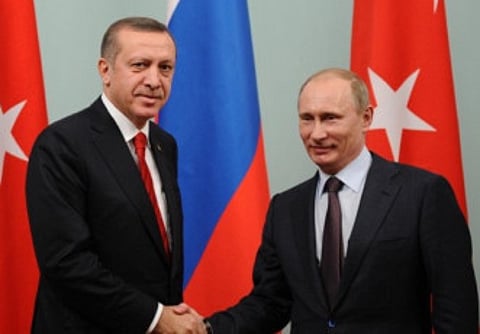Fast tracking to one-man rule
While Putin is the only one who really matters in Russia, Erdogan is taking tangible steps to become a ‘Turkish Putin’

Two world leaders stand out among others to the extent that both run their countries through personal ambitions rather than national interests. It is becoming increasingly apparent that both Turkish and Russian presidents are heading towards a governing system bordering on dictatorship or, to put it mildly, one-man rule. While President Vladimir Putin is effectively the only senior official in his country who really matters on all aspects of national life in Russia, the newly elected President Recep Tayyip Erdogan is practically taking steps to become a “Turkish Putin” in his country. Erdogan has already declared that he will preside over cabinet meetings as of January 19, almost sweeping away his own protege, Ahmet Davutoglu, newly promoted to the post of prime minister by Erdogan.
For many in Turkey, this is a colossal step shifting the country from a liberal-based parliamentarian system to a much more rigid presidential system where power is firmly in the president’s hands. In fact, the former Turkish president, Abdullah Gul, whose term expired recently, has quietly expressed his reservations about this potential change of governing mode in his country.Speaking earlier in November 2014 to members of the London’s Royal Institute for International Affairs, better known as “Chatham House”, Gul seemed clearly in favour of maintaining the parliamentary system. Without directly criticising his long-time colleague and comrade in the Turkish Islamic movement, he made his views quite clear. The former president said: “Everyone knows that I see a parliamentarian system as a better and more suitable system [for Turkey], but of course one cannot say that a presidential system is not good system.” Citing the US democratic presidential system, he went further to explain that for presidential system to remain democratic “you need to check everything, you need to have your balances in the right place [check and balance system].”
In another word, Gul was indirectly warning of the dire result of speedily shifting politics towards a more presidential system in Turkey. Many see this as already happening with “a yes-man” prime minister in Erdogan’s current administration. While confirming his intention to preside over the next Cabinet meeting on January 19 in Bestepe (the newly built presidential palace already dubbed AK Saray), the Turkish president defends himself by saying that he is merely using the executive powers given to the president in the constitution. “I have said”, Erdogan explained last week, “as a president who was directly elected by the people, I will make full use of the powers bestowed by the Constitution.” He also indicated that he will be chairing Cabinet meetings regularly instead of from time to time as formal presidents used to do which is making critics suggest that increasing executive powers in the president’s hands will likely intensify Turkey’s drift towards one-man rule.
Erdogan’s new home, AK Saray (White Palace), the presidential palace on a hilltop near the capital Ankara, is another testament to the extravagance style of a president whose AK Islamist Party has dominated Turkish politics for more than a decade. AK Saray brings back memories of the lucrative life style of the many Sultans of the Ottoman Caliphate. With its 1,000 rooms, of which the 250-room private residence for the president is at a cost of almost $350 million (Dh1.2 billion), AK Saray has already been dubbed by opposition as Cac-AK Party (the party of thieves). Erdogan defended his decision to build the palace considering it as a piece of art and a “show of the country’s prestige.”
Putin’s Fortunes
Fifteen years since his appearance at the forefront of Russian politics following the resignation of the late president Boris Yeltsin on December 31, 1999, Putin, a former senior KGB officer, has been leading his country almost singlehandedly. Apart from an interruption of four years as prime minister (2008-2012) during which he handed over the presidency, for constitutional reasons (the president cannot remain in his position for longer than two successive years), to his protege Dmitri Medvedev, Putin has been Russia’ strongman since the dawn of the new millennium. With oil prices shooting up in 2000s, he succeeded in bringing prosperity to Russia and during his first term in office, Russia saw the rise of a solid middle class and he managed to pull his country out of Yeltsin’s messy years to sustainable growth. Putin also sought close ties with the West during that period. But in the years that followed, things sadly began to take a different direction as Putin accused the West, particularly the US, of betrayal and encroaching into Russia’ “sphere of influence”, in reference to, as he saw it, the West’s attempts to bring Ukraine closer to European Union. He reacted militarily by annexing Crimea and sent Russian troops to Eastern Ukraine instead of talking to his European “partners”, particularly Germany. Chancellor Angela Merkel, who’s been frequently on the phone to Putin, made it quite clear in her New Year statement that Europe is working for security “with Russia” and not against it. With more than 50 per cent of Russia’s international trade with the EU countries and a drastic fall in oil prices, Putin cannot ignore the colossal consequences of his confrontational policy with the West
Mustapha Karkouti is a former president of the Foreign Press Association, London.


